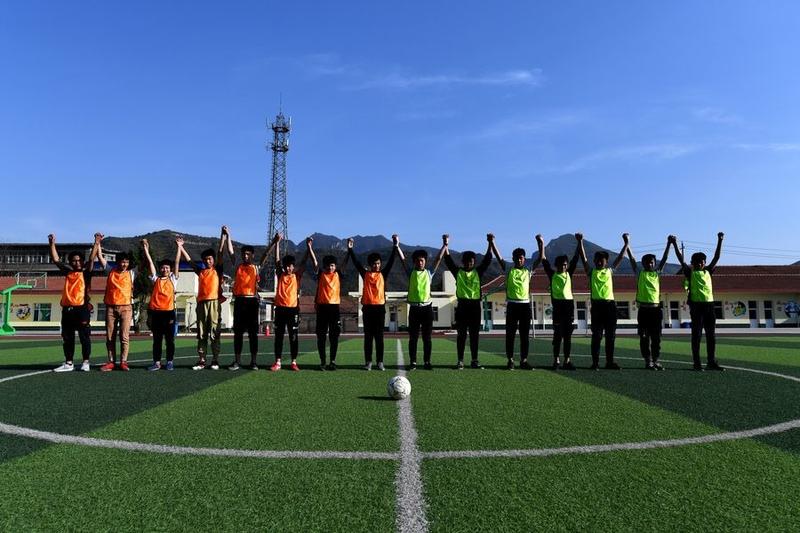 Students pose for photos after a football match at Huangyadong school in Licheng county of Changzhi city, in north China's Shanxi province, on April 17, 2019. (PHOTO / XINHUA)
Students pose for photos after a football match at Huangyadong school in Licheng county of Changzhi city, in north China's Shanxi province, on April 17, 2019. (PHOTO / XINHUA)
A number of ministry-level departments, including those responsible for sport, technologies, finance and market regulation have responded recently to matters of public concern.
All urban areas to have soccer facilities by 2035
All urban communities nationwide will have soccer facilities by 2035, according to a document jointly issued by the Ministry of Housing and Urban-Rural Development and the General Administration of Sport of China on Dec 29.
The announcement follows the success of a pilot construction project in nine cities, including Wuhan, Hubei province, and Shenzhen, Guangdong province, launched in April 2019.
Under the project, the government has built 66 standard football pitches and 713 nonstandard ones in nine cities, said Huang Yan, vice-minister of Housing and Urban-Rural Development.
ALSO READ: Fresh face brings diverse experiences to soccer training
The pitches were established in urban communities, utilizing free spaces such as river banks, beach areas and public parks in cities including Wuhan and Shenzhen, Huang said.
Authorities simplified the process through land approval procedures, and established fundraising methods and long-term management practices to help solve other issues football development faced in communities.
In principle, small-scale procurement projects should all be reserved for small and medium-sized enterprises, according to a document jointly issued by the Ministry of Finance and the Ministry of Industry and Information Technology
Procurement policy to favor, bolster SMEs
The government is aiming to boost the development of small and medium-sized enterprises through preferential government procurement policies.
In principle, small-scale procurement projects should all be reserved for SMEs, according to a document jointly issued by the Ministry of Finance and the Ministry of Industry and Information Technology on Dec 29.
The document clarified and specified a series of supportive measures for SMEs to participate in government procurement.
Data from the Ministry of Finance showed that China's government procurement exceeded 3.3 trillion yuan (US$509 billion) in 2019, equivalent to 10 percent of the country's fiscal expenditures, or 3.3 percent of GDP.
The government procurement contract amount of medium-, small-and micro-sized enterprises exceeded 2.45 trillion yuan in 2019, accounting for 74.1 percent of national government procurement.
Small and medium-sized companies serve as an important foundation for realizing the country's high-quality economic growth.
In 2011, the government issued interim measures to expand its participation in government procurement projects.
Corporate credit bond disclosure rules unified
Authorities have unified the rules on information disclosure concerning a company's corporate credit bonds, with the aim of better protecting investors.
On Dec 28, the People's Bank of China, the National Development and Reform Commission and the China Securities Regulatory Commission jointly published the rules, which will take effect on May 1.
READ MORE: China unifies disclosure rules for corporate credit bonds
In China, companies can issue corporate credit bonds, which include nonfinancial enterprise debt financing instruments, corporate bonds and enterprise bonds, in the interbank market and exchanges. Until now, there have been no unified rules for the three types of bonds regarding information disclosure.
Based on the practice of the domestic market and drawing on international experience, the new rules unify the requirements regarding information disclosure on issues such as essential documents, content, timing and frequency, according to a statement posted on the website of the PBOC, the central bank.
The rules also make detailed requirements on the contents, structure and formats of bond prospectuses and periodic reports.
Improved regulation of government services
The State Administration for Market Regulation on Dec 28 issued two national standards in order to better regulate government services.
The new standards took effect on Friday.
According to Chen Hongjun, an official with the administration, the standards involve service assessment of government affairs, agencies, platforms and personnel. Services that receive a poor rating will be required to make rectifications.
The administration plans to carry out various training programs online and offline this year to promote the application of the standards so that enterprises and the public can voluntarily rate the quality of government services they receive, Chen said.
Xinhua contributed to this story.


